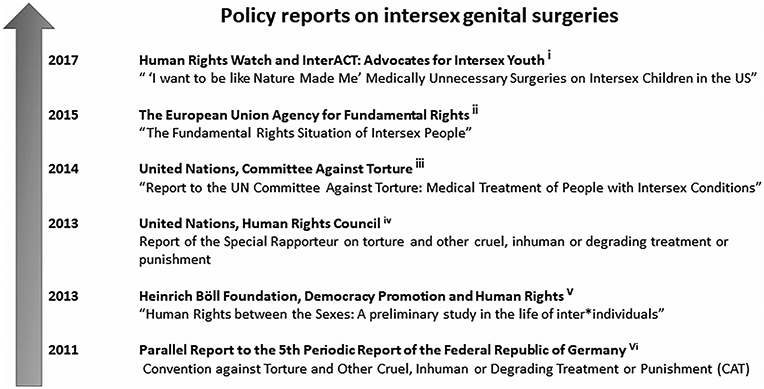Figure 1.

Policy reports during this decade that make reference to human rights principles to address intersex genital surgeries. i. This report includes verbatim statements of: (i) intersex people from California, New York, Massachusetts, Texas, Florida, Maryland, Illinois, Wisconsin and New Jersey, (ii) parents of intersex children from California, Florida, Texas, Iowa, Wisconsin, Massachusetts, and New York, and (iii) providers from seven undisclosed State of origin to meet their request of anonymity. ii. This report opines that their Member States ‘…should avoid non-consensual ‘sex-normalising’ medical treatments on intersex people.’ iii. Tamar-Mattis (2014). This report concludes that ‘Intersex people in the USA suffer significant harm as a result of genital-normalising surgery in childhood, involuntary sterilisation, excessive genital exams and medical display, human experimentation and denial of needed medical care. Such treatment constitutes a violation of human rights as recognised by multiple international bodies’ (p. 4). iv. Méndez (2013). As previously argued by Veith (2011), this report validates the use of the term ‘torture’ when referring to the practice of medical procedures that were not consent to by affected individuals. In reference to lesbian, gay, bisexual, transgender and intersex persons, ‘The Special Rapporteur calls upon all States to repeal any law allowing intrusive and irreversible treatments, including forced genital-normalising surgery, involuntary sterilisation, unethical experimentation, medical display, “reparative therapies” or “conversion therapies”, when enforced or administered without the free and informed consent of the person concerned. He also calls upon them to outlaw forced or coerced sterilisation in all circumstances and provides special protection to individuals belonging to marginalised groups’ (p. 23). v. Ghattas, (2013). This report examines human rights across countries for whom the author denominates ‘inter* individuals’ in Western/Central Europe, Eastern Europe/The Balkans, Africa, South America, Oceania and Asia. vi. Veith (2011). This report delineates several aspects of medical treatment of intersexuality in Germany as torture. Although the term is usually used in the context of interrogation, punishment or intimidation of a captive, the report expands this definition to include ‘medically unnecessary genital ‘normalising’ surgeries and hormone treatments that were not legally consented to by the patient’ (p. 16).
